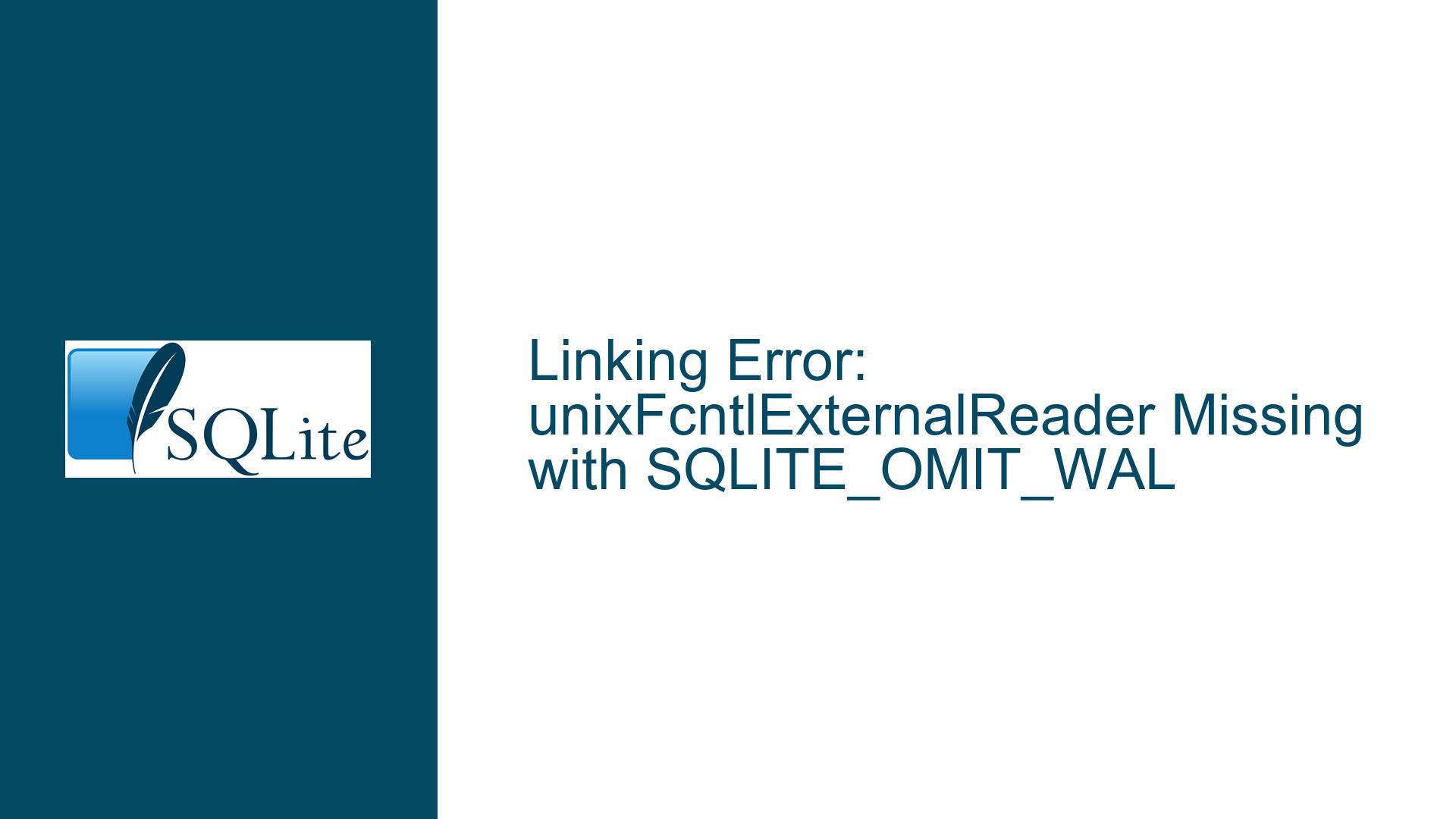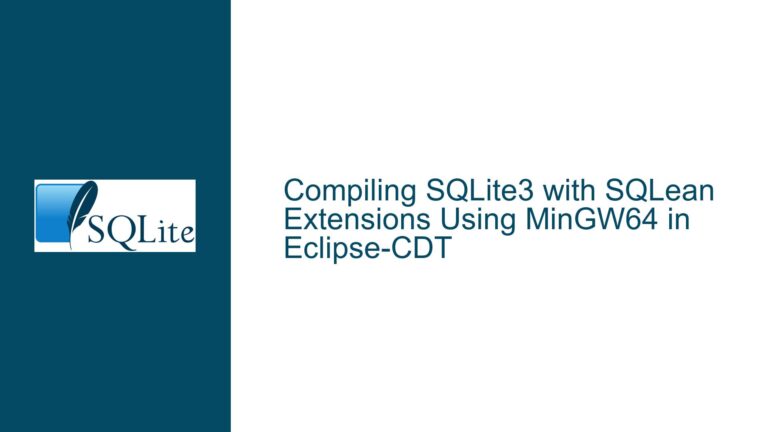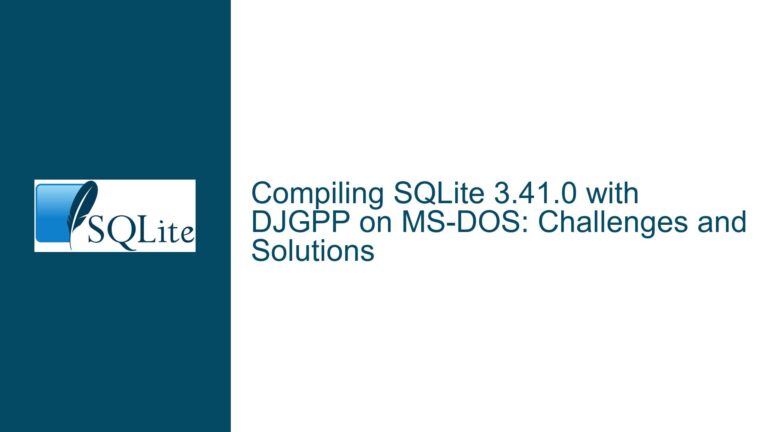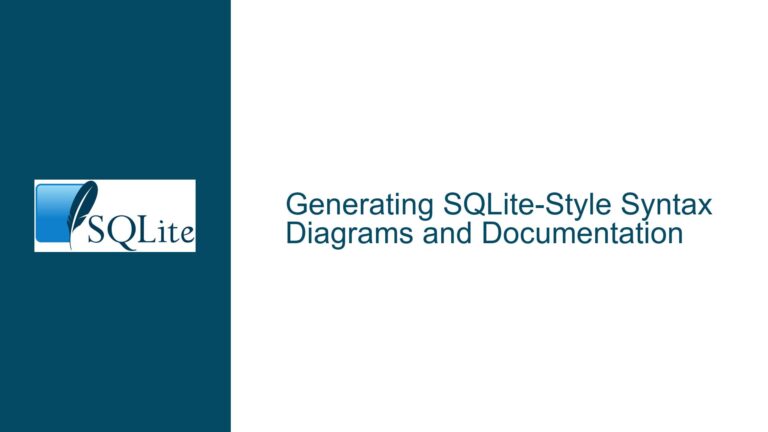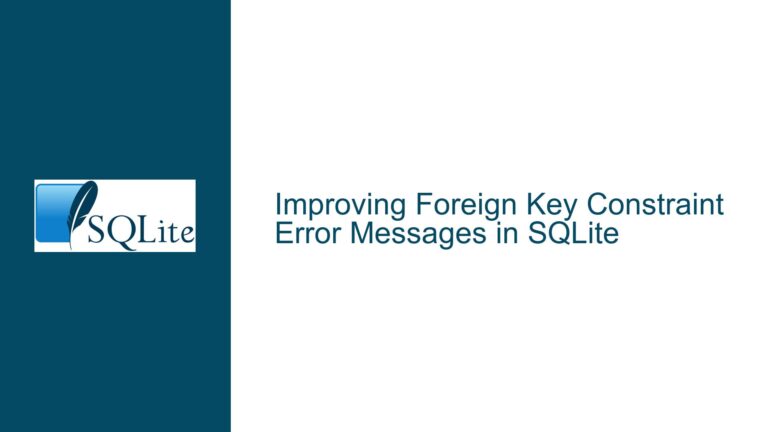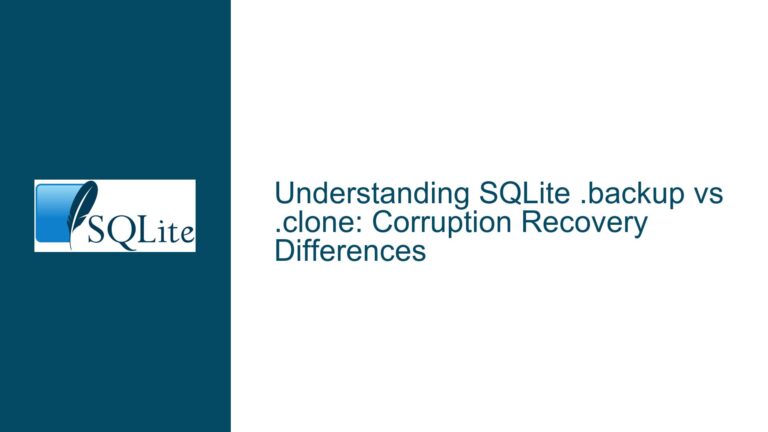Linking Error: unixFcntlExternalReader Missing with SQLITE_OMIT_WAL
Understanding the Linker Error: unixFcntlExternalReader() Not Found
The SQLite library employs a modular architecture where specific features are conditionally included or excluded at compile time using preprocessor macros. One such macro is SQLITE_OMIT_WAL, which removes support for Write-Ahead Logging (WAL), a mechanism for atomic commits and rollbacks in database transactions. When compiling SQLite with SQLITE_OMIT_WAL, developers may encounter a linker error indicating that the symbol unixFcntlExternalReader() is undefined. This error arises because the function is excluded from the build when WAL is omitted, but other parts of the codebase still reference it.
The unixFcntlExternalReader() function is part of SQLite’s Unix VFS (Virtual File System) layer. Its primary role is to manage file locks and synchronization in WAL mode. When WAL is disabled via SQLITE_OMIT_WAL, the build process removes code blocks guarded by #ifndef SQLITE_OMIT_WAL directives. However, prior to SQLite version 3.37.0, the function unixFcntlExternalReader() was erroneously placed inside such a conditional block. This led to its exclusion from the compiled binary, even though it was still referenced in non-WAL code paths related to file locking. The linker error occurs because the function declaration remains in header files, creating an unresolved external symbol during the linking phase.
This issue highlights the delicate balance between compile-time configuration and internal dependencies in SQLite. The WAL mechanism is deeply integrated with the VFS layer, and disabling it requires careful adjustments to avoid dangling references. The error is particularly insidious because it manifests only under specific build configurations, making it difficult to diagnose without a thorough understanding of SQLite’s internal code structure.
Root Causes of the Missing unixFcntlExternalReader() Function
The linker error stems from two interrelated factors: incorrect conditional compilation and unresolved dependencies in the VFS layer.
First, the unixFcntlExternalReader() function was historically tied to WAL mode. In SQLite versions prior to 3.37.0, its implementation was enclosed within #ifndef SQLITE_OMIT_WAL preprocessor directives. This assumed that the function was only needed when WAL was enabled. However, unixFcntlExternalReader() also plays a role in managing file locks in non-WAL scenarios, particularly in systems using the Unix fcntl() API for advisory locks. When SQLITE_OMIT_WAL is defined, the function is excluded, but its declaration in header files remains intact. This creates a mismatch between the function’s visibility in the code and its actual availability in the compiled binary.
Second, SQLite’s VFS layer uses a pluggable architecture where platform-specific implementations (e.g., Unix, Windows) register methods for file operations. The Unix VFS implementation includes unixFcntlExternalReader() as part of its lock management routines. Even when WAL is disabled, certain file-locking operations in default journaling modes (e.g., rollback journal) may indirectly rely on this function. For example, in shared-memory scenarios or when multiple processes access the same database, SQLite uses fcntl() locks to coordinate access. The removal of unixFcntlExternalReader() disrupts these codepaths, leading to unresolved symbol errors.
A third contributing factor is the use of build automation tools that generate platform-specific code. SQLite’s build process dynamically includes or excludes source files based on configuration macros. If the build scripts do not account for all dependencies between modules, critical functions like unixFcntlExternalReader() may be omitted incorrectly. This is especially problematic for developers who compile SQLite from source with custom configurations, as they may lack visibility into the intricate dependencies between features.
Resolving the Linker Error: Fixes and Best Practices
To resolve the unixFcntlExternalReader linker error, developers must address both the immediate symptom (missing function) and the underlying cause (incorrect conditional compilation). The following steps outline a systematic approach to troubleshooting and fixing the issue:
Upgrade to SQLite 3.37.0 or Later: The SQLite development team addressed this issue in commit 948c2cb2a2f44ba0, which is included in version 3.37.0. This commit moves the
unixFcntlExternalReader()function outside theSQLITE_OMIT_WALconditional block, ensuring it is compiled even when WAL is disabled. Developers should verify their SQLite version usingsqlite3_libversion()and update to a patched release if necessary.Audit Compile-Time Flags: If upgrading is not feasible, review the compilation flags passed to the SQLite build process. Ensure that
SQLITE_OMIT_WALis strictly necessary for your use case. Disabling WAL reduces transactional concurrency and may not provide significant performance benefits in non-WAL environments. If WAL must be omitted, manually modify the SQLite source code to includeunixFcntlExternalReader()by removing the#ifndef SQLITE_OMIT_WALguard around its definition inos_unix.c.Reconcile VFS Dependencies: The Unix VFS layer relies on a consistent set of functions for file locking, regardless of journaling mode. If
unixFcntlExternalReader()is excluded, replace its functionality with alternative locking mechanisms. For example, use theSQLITE_FCNTL_LOCKSTATEfile control opcode to manage locks directly. However, this approach requires deep familiarity with SQLite’s internals and is not recommended for most users.Use Runtime Configuration Instead of Compile-Time Flags: Instead of omitting WAL at compile time, disable it at runtime using
PRAGMA journal_mode=DELETE;. This retains all WAL-related code in the binary but defaults to the rollback journal mode. This avoids linker errors while achieving similar functionality.Validate Symbol Exports: After compiling SQLite, inspect the generated library for the presence of
unixFcntlExternalReader()using tools likenm(Unix) ordumpbin(Windows). For example:nm libsqlite3.a | grep unixFcntlExternalReaderIf the symbol is missing, revisit the build configuration to ensure that no conflicting flags are set.
Leverage Custom VFS Implementations: If the default Unix VFS is problematic, register a custom VFS that implements only the necessary methods. Override the
xShmLockandxShmBarriermethods to provide no-op implementations or alternative locking strategies. This decouples the application from the default VFS dependencies.
By methodically applying these solutions, developers can eliminate the linker error while maintaining a stable and functional SQLite build. The key takeaway is to prefer runtime configuration over compile-time feature omission unless there is a strict requirement for minimizing binary size. When using SQLITE_OMIT_* flags, always verify that dependent functions are either retained or replaced to prevent unresolved symbol errors.
